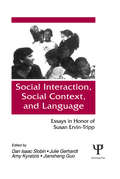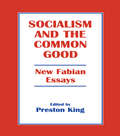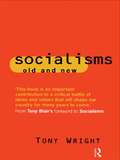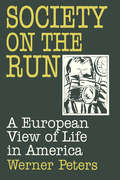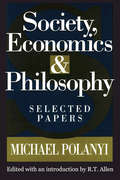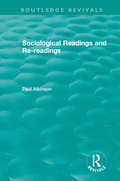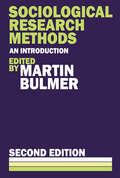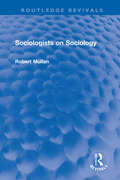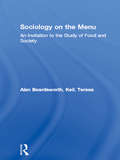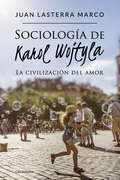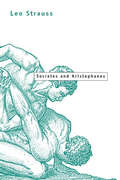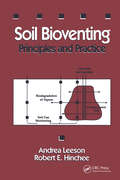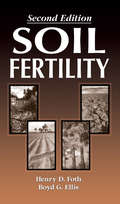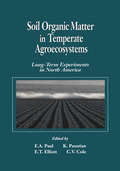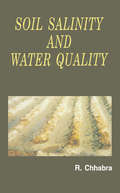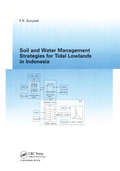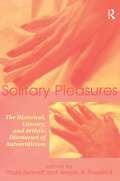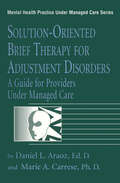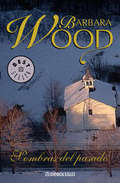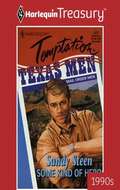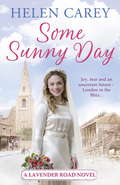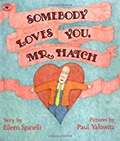- Table View
- List View
Social interaction, Social Context, and Language: Essays in Honor of Susan Ervin-tripp
by Dan Isaac Slobin Jiansheng Guo Julie Gerhardt Amy KyratzisThis collection of essays is a representative sample of the current research and researchers in the fields of language and social interactions and social context. The opening chapter, entitled "Context in Language," is written by Susan Ervin-Tripp, whose diverse and innovative research inspired the editors to dedicate this book to her honor. Ervin-Tripp is known for her work in the fields of linguistics, psychology, child development, sociology, anthropology, rhetoric, and women's studies. She has played a central role in the definition and establishment of psycholinguistics, child language development, and sociolinguistics, and has been an innovator in terms of approaches and methods of study. This book covers a wide range of research interests in the field, from linguistically oriented approaches to social and ethnography oriented approaches. The issue of the relationships between forms and structures of language and social interactions is examined in studies of both adult and child speech. It is a useful anthology for graduate students studying language and social interaction, as well as for researchers in this field.
Socialism and the Common Good: New Fabian Essays
by Preston KingIn this collection, contributors discuss a central theme which is both theoretical and practical - the role of the state in achieving social justice in modern market systems from a socialist perspective. They reject the cult of choice and of rational egoism.
Socialisms: Old and New
by Tony WrightThis is a revised and updated edition of Tony Wright's critically acclaimed work that first appeared a decade ago. It provides a lucid and accesible survey of the major strands of socialist thinking right up to the present day and includes an assessment of the renewal of socialism in Britain. It is an indispensable text for students and a stimulating guide to socialism past and present. But it is also a book with an argument. Tony Wright makes the case for a socialism that learns the lessons of its own history, roots itself in an ethic of community and applies traditional values in new ways. It is a book for everyone who wants to understand where socialism has come from - and where it might still be going.
Society on the Run: A European View of Life in America
by W. PetersA study of the United States and its political culture. The author contends that democracy exists at the level of political institutions and processes in the US as well as in its private sector.
Society, Economics, and Philosophy: Selected Papers
by Michael PolanyiSociety, Economics and Philosophy represents the full range of Polanyi's interests outside of his scientific work: economics, politics, society, philosophy of science, religion and positivist obstacles to it, and art. Polanyi's principal ideas are contained in three essays: on the scientific revolution, the creative imagination and the mind-body relation. Precisely because of Polanyi's work in the physical sciences, his writings have a unique dimension not found in other advocates of the market and too infrequently found even in philosophers of science.Polanyi was a powerful critic of totalitarianism and of the deficiencies of the usual defenses of freedom which helped to prepare the way for it. Freedom, he argued, can be based only upon truth and dedication to transcendent ideals, not upon skepticism, utilitarianism and the liberty of doing merely as one pleases. At a time when easy slogans about socialism were dominant in intellectual circles, epitomized by Sidney and Beatrice Webb, and when calls for the central planning of scientific research were made by such as J.D. Bernal, Polanyi exposed their errors and showed that science can flourish only in a free society.More radically than even von Mises and Hayek, Polanyi showed that an industrial economy can operate only polycentrically, that central planning is logically impossible, and that what was called by that name in the Soviet Union was in reality no such thing. Likewise, scientific research can proceed, not by a central plan, but only by the spontaneous self-adjustment of separate initiatives to discover a common reality. Against the positivism dominant within philosophy of science, he argued that the notion of reality must be restored and made central. Yet physical sciences, he also argued, are only one branch of science, and the sciences of life and mind are logically richer and more complex and cannot be reduced to the former, nor mind to body or to computers, nor art to its ph
Sociological Readings and Re-readings (Routledge Revivals #Vol. 4)
by Paul AtkinsonPublished in 1996, this book comprises a number of essays by Paul Atkinson in which he reflects on processes of reading and writing in the social sciences. Topics covered include: ethnographers’ ‘confessions’, an analysis of the style of Erving Goffman, a reflection of his own experiences of re-reading work, and a discussion of the challenges of reading an alien discipline. This book was originally published as part of the Cardiff Papers in Qualitative Research series edited by Paul Atkinson, Sara Delamont and Amanda Coffey. The series publishes original sociological research that reflects the tradition of qualitative and ethnographic inquiry developed at Cardiff. The series includes monographs reporting on empirical research, edited collections focussing on particular themes, and texts discussing methodological developments and issues.
Sociological Research Methods: An Introduction
by Martin BulmerA rich source of ideas about sociological research methods to assist the researcher in determining what method will provide the most reliable and useful knowledge, how to choose between different methodologies, and what constitutes the most fruitful relationship between sociological theories and research methods.
Sociologists on Sociology (Routledge Revivals)
by Robert MullanOriginally published in 1987, this edition in 1996, Sociologists on Sociology is a unique and sometimes controversial account of the development, disputes and the future of sociology as seen through the eyes of eleven of the world’s leading sociologists at the time. Consisting of interviews with – Anthony Giddens, Robert K. Merton, Howard Becker, Peter Townsend, Ralf Dahrendorf, Peter Worsley, Stuart Hall, John Rex, Michael Mann, Laurie Taylor and Ann Oakley – the book explores such crucial issues as the nature of deviance, the scientific status of sociology, the relationship of Marxism and sociology, the contours of race and class, feminism, relevance of ethnomethodology and the procedures of participant observation. The contributions of such figures as Goffman, Mills, Parsons, Weber and Foucault are assessed, and in clear and concise language the contributors discuss their own theoretical interests and empirical work in the field. Students and practitioners of the social sciences will find the book a fascinating and a uniquely direct insight into the thoughts of sociology’s leading figures and a remarkable cumulative assessment of the state of the discipline itself.
Sociology on the Menu: An Invitation to the Study of Food and Society
by Alan Beardsworth Teresa KeilSociology on the Menu is an accessible introduction to the sociology of food. Highlighting the social and cultural dimensions of the human food system, from production to consumption, it encourages us to consider new ways of thinking about the apparently mundane, everyday act of eating. The main areas covered include:* The origins of human subsistence and the development of the modern food system* Food, the family and eating out* Diet, health and the body image* The meanings of meat and vegetarianism.Sociology on the Menu provides a comprehensive overview of the literature, particularly helpful in this interdisciplinary field. It focuses on key texts and studies to help students identify major concerns and themes for further study. It urges us to re-appraise the taken for granted and familiar experiences of selecting, preparing and sharing food and to see our own habits and choices, preferences and aversions in their broader cultural context.
Sociología de Karol Wojtyla: La civilización del amor
by Juan Lasterra MarcoEl siglo XXI nace con la nueva utopía social de Karol Wojtyla: una sociedad personalista, la sociedad del amor. Ha muerto el optimismo por la utopía del comunismo que prometía el progreso de las fuerzas de la materia, hasta llegar al «paraíso comunista», un mundo feliz. Ha muerto también el liberalismo como utopía que prometía el progreso y la sociedad del bienestar, con la defensa de la «individualidad absoluta». Entramos en el siglo XXI en el que, muertas las grandes utopías, se está imponiendo en todas las naciones la «democracia vacía». En este nuevo milenio se nos presenta una nueva utopía, la de una sociedad personalista, la sociedad del amor. Una sociedad en la que lo primero, la base de toda iniciativa sea la persona humana, y su ámbito natural de desarrollo el matrimonio y la familia, y el trabajo; los dos «indicadores de calidad» para la evaluación del adecuado funcionamiento de toda sociedad, los dos pilares sobrelos que el hombre como persona humana, ser-en-relación, se realiza.
Socrates and Aristophanes
by Leo StraussIn one of his last books, Socrates and Aristophanes, Leo Strauss's examines the confrontation between Socrates and Aristophanes in Aristophanes' comedies. Looking at eleven plays, Strauss shows that this confrontation is essentially one between poetry and philosophy, and that poetry emerges as an autonomous wisdom capable of rivaling philosophy. "Strauss gives us an impressive addition to his life's work—the recovery of the Great Tradition in political philosophy. The problem the book proposes centers formally upon Socrates. As is typical of Strauss, he raises profound issues with great courage. . . . [He addresses] a problem that has been inherent in Western life ever since [Socrates'] execution: the tension between reason and religion. . . . Thus, we come to Aristophanes, the great comic poet, and his attack on Socrates in the play The Clouds. . . [Strauss] translates it into the basic problem of the relation between poetry and philosophy, and resolves this by an analysis of the function of comedy in the life of the city." —Stanley Parry, National Review
Soil Bioventing: Principles and Practice
by Andrea Leeson Robert E. HincheeSoil bioventing is one of the most popular modern techniques for removing contaminants from soil. It has recently emerged as one of the most cost-effective and efficient technologies available for vadose zone remediation of petroleum-contaminated sites. This book explains in practical terms how to carry out a bioventing program. It is an interdisciplinary treatment of the subject, covering everything from basic physical and chemical properties of soils to site evaluation, project design, and post-bioventing monitoring.The wide breadth of coverage makes Soil Bioventing useful to a large audience, including consulting firms, students, contractors, environmental managers, and anyone who is responsible for supervision of soil cleanup for regulatory reasons.
Soil Fertility
by Boyd Ellis Henry FothSoils are one of the world's most important resources, and their protection, maintenance, and improvement is critical to the continuance of life on earth. Soil Fertility, Second Edition, offers thorough coverage of the fertility, composition, properties, and management of soils. This book carries on the tradition of excellence established by authors Henry Foth and Boyd Ellis, leading soil scientists whose previous books in this field have become multi-edition classics.The Second Edition of Soil Fertility has been significantly expanded to include more information on mineralogy, while keeping the thorough coverage of essential topics. The book presents soils as dynamic, constantly changing bodies, and relates soil fertility and management to the mineralogy of their origin. Four new chapters offer updated information on soil charge properties, ion adsorption, exchange and fixation, and soil reaction. There is also a far greater emphasis on environmental issues, reflecting the increasing importance of environmental concerns to agronomists and soil scientists today.
Soil Organic Matter in Temperate AgroecosystemsLong Term Experiments in North America
by Eldor A. Paul Keith H. Paustian E. T. Elliott C. Vernon ColeThe presence - or absence - of soil organic matter (SOM) has important implications for agricultural productivity. It could also have significant implications for global climate due to its role as a source/sink of carbon. Therefore, it is important to understand the issues related to the accumulation or loss of SOM, to use what we have learned from experiments to make sound decisions about soil and crop management, and to test models and future concepts concerning SOM management. A database is included with the book, presenting tabular data for 34 sites in North America. Soil Organic Matter in Temperate Agroecosystems discusses all of these issues and more, answering such questions as:
Soil Salinity and Water Quality
by R. ChhabraThis volume covers such areas in the field of soil salinity and water quality as: origin and distribution of salt-affected soils; management of alkali soils; quality criteria of irrigation water; wastewaters as a source of irrigation; and grasses and trees in the management of salt-affected soils.
Soil and Water Management Strategies for Tidal Lowlands in Indonesia
by Fransiscus Xaverius SuryadiThis book presents a methodology to support the development of soil and water management strategies for tidal lowlands in general and Indonesian tidal lowlands in particular. It analyzes and evaluates the potential of tidal lowlands for agricultural development.
Solitary Pleasures: The Historical, Literary and Artistic Discourses of Autoeroticism
by Paula Bennett Vernon A. Rosario IISolitary Pleasures is the first anthology to address masturbation, exploring both the history and artistic representation of autoeroticism. Masturbation today enjoys a highly equivocal and contradictory status among cultural discourses relating to sexuality. On the one hand, it is the subject of much popular treatment, especially in sexual self-help books, advice columns, and in pop culture--for example, Madonna's "Like a Virgin" performance, a recent Roseanne episode, and David Russell's movie Spanking the Monkey. On the other hand, masturbation is still a taboo subject for most people in everyday conversation. Perhaps more surprising, it has been largely dismissed by academics as a trivial, humorous topic and the "history of a delusion."It was not until the eighteenth century that "onanism" was portrayed as a morbid act of epidemic proportions that produced pox, hair loss, blindness, insanity, impotence and a horrible. Its prevention and treatment warranted diverse and often cruel measures: surveillance, diets, drugs, corsets, electrical alarms, urethral cauterization, clitoridectomy, and labial sewing. This literature's apocalyptic warnings about the personal and social morbidity of "pollution-by-the-hand" are largely unknown to most people today, but the ghostly echoes of these admonitions still inform and preserve the present taboo of the subject.Why did this apparently innocuous activity become so overpoweringly stigmatized? Why was the eradication of masturbation one of the most important goals of 19th century public hygiene? Why, even after the "sexual revolution," is masturbation still shrouded in shame?
Solution-Oriented Brief Therapy For Adjustment Disorders: A Guide
by Daniel L. Araoz Marie A. CarreseFirst published in 1996. Routledge is an imprint of Taylor & Francis, an informa company.
Sombras del pasado (Bestseller/debolsillo Ser. #Vol. 458)
by Barbara WoodBarbara Wood nos sorprende con una novela llena de emoción, romance y suspense. El abuelo de Andrea está agonizando. Para estar junto a él, ella se desplaza desde Los Ángeles, donde reside, hasta Manchester, la ciudad inglesa donde nació y que abandonó de pequeña con sus padres. Cuando entra en la vieja casa familiar, Andrea no puede evitar un estremecimiento. En ella no solo está su abuela; las sombras de otras personas, que en el pasado provocaron terribles acontecimientos, parecen flotar en el ambiente caduco y resignado. Esas sombras giran en torno a un nombre, el de Victor Townsend, su bisabuelo materno. Un demonio en forma humana, según la abuela de Andrea. ¿Serán visiones o será el pasado que regresa a exigir sus derechos? Lo cierto es que Andrea se encuentra paulatinamente envuelta en la historia de aquellos acontecimientos, puñados de pasión, dolor y sacrificio. Y a través de ellos conocerá el verdadero sentido de la palabra «amor». Con ello, como la mejor herencia, podrá regresar a su mundo. A su vida.
Some Kind Of Hero
by Sandy SteenTwo single mothers look for love with charming cowboys in this duo of novels. In Steen's "Some Kind of Hero", Sharon Kramer answers Jared Markham's personal ad while on the run with her little girl. And in Pade's "Cowboy's Kiss", Jackson Heller loses his Wyoming ranch thanks to his father's will to city-bred Ally Brooks and her daughter. But they soon lasso Jackson's stony heart.
Some Sunny Day (Lavender Road 2)
by Helen CareyIn Helen Carey's poignant and nostalgic novel SOME SUNNY DAY, it's 1940, and two young women are growing up in a world full of drama and danger. Perfect reading for fans of Kate Thompson and Donna Douglas.September 1940As Luftwaffe bombs rain from the skies over London, the women of Lavender Road are fighting their own battles.Shy Katy Parsons has always been sheltered by her over-protective parents. The war is her chance to see life from beyond her bedroom window. Enrolling as a nurse was always her dream, but the reality is tougher than she ever imagined. And falling in love isn't all plain sailing either...Privileged Louise Rutherford secretly hoped the war would bring her some fun and romance. But far it has brought her pain and grief, and now she has a secret... something her strict father must never find out about.London during the Blitz is a dangerous place to live but the Lavender Road residents never stop believing their sunny day will come.
Some Sunny Day (Lavender Road 2)
by Helen CareyIn Helen Carey's poignant and nostalgic novel SOME SUNNY DAY, it's 1940, and two young women are growing up in a world full of drama and danger. Perfect reading for fans of Kate Thompson and Donna Douglas.September 1940As Luftwaffe bombs rain from the skies over London, the women of Lavender Road are fighting their own battles.Shy Katy Parsons has always been sheltered by her over-protective parents. The war is her chance to see life from beyond her bedroom window. Enrolling as a nurse was always her dream, but the reality is tougher than she ever imagined. And falling in love isn't all plain sailing either...Privileged Louise Rutherford secretly hoped the war would bring her some fun and romance. But far it has brought her pain and grief, and now she has a secret... something her strict father must never find out about.London during the Blitz is a dangerous place to live but the Lavender Road residents never stop believing their sunny day will come.
Some Thoughts on Business Plans
by William A. SahlmanA framework for assessing new business opportunities and the business plans used to describe them is developed. Useful for aspiring entrepreneurs in MBA programs.
Somebody Loves You Mr. Hatch (Stories To Go!)
by Eileen SpinelliAn anonymous valentine changes the life of the unsociable Mr. Hatch, turning him into a laughing friend who helps and appreciates all his neighbors
Someone's Been Sleeping In My Bed
by Linda Winstead JonesOf late, life had hardly been a fairy tale for the lovely, golden-haired Maddalyn Kelly. Nearly killed in a stagecoach robbery, the beautiful blonde escaped deep into the forest of Wyoming. This was a far cry from the simple life she had planned for herself as a modest schoolteacher. Hungry, lost, and weary, Maddalyn finally came upon a cozy mountaintop cabin. There were three of everything: three delicious meals, three comfortable chairs, and three warm beds. She could not help dozing for just a moment . . . Maddalyn quickly learned that the cabin belonged to three burly and intimidating brothers: Karl, Conrad, and Eric Bartlett. She had eaten Eric's food, slept in Eric's bed. He seemed a wild animal, but did his gruff manner belie a softer side? Feisty Maddalyn was determined to find out . . .
